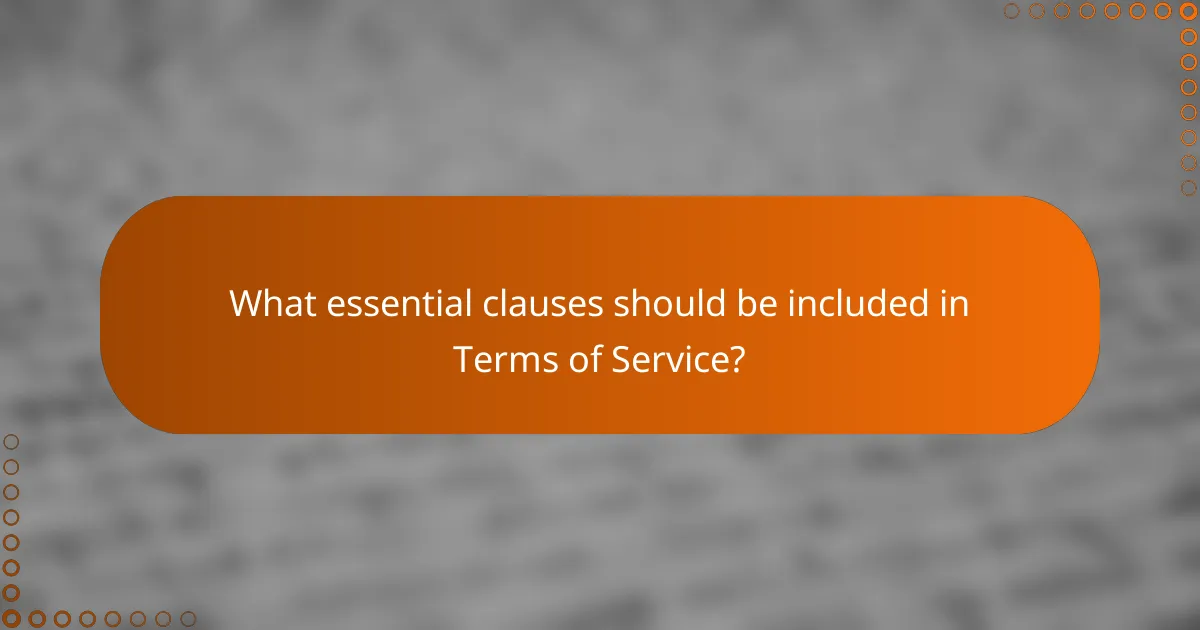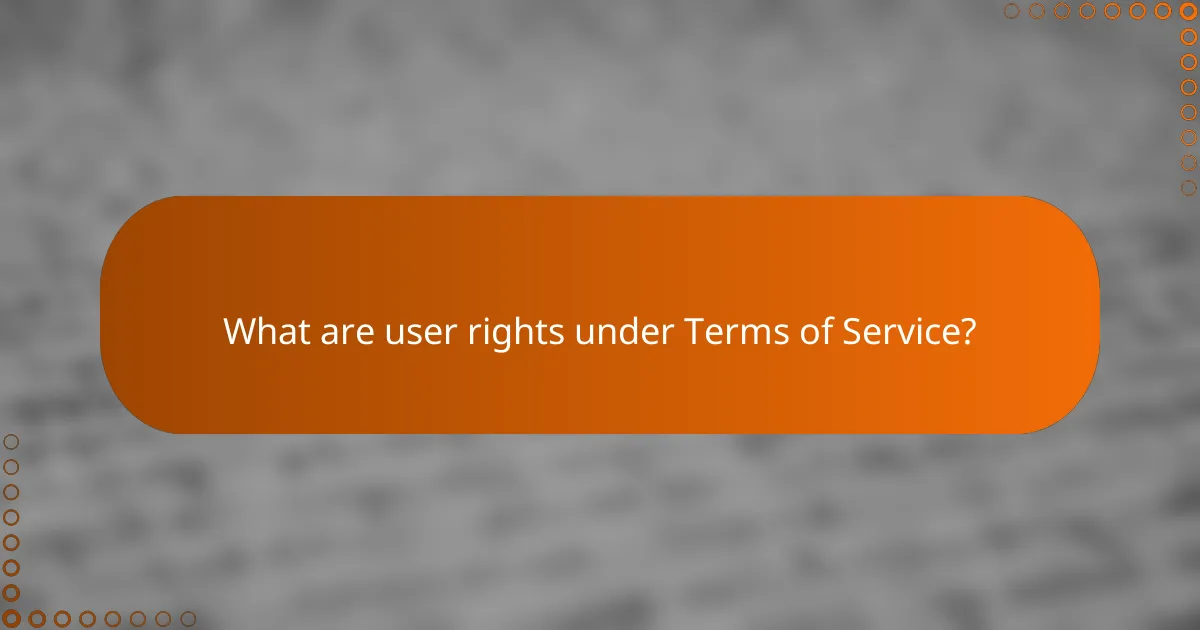Understanding the Terms of Service (ToS) is crucial for users as they outline essential clauses that clarify rights, obligations, and the legal framework of a service. These agreements typically cover privacy policies, limitations of liability, and dispute resolution processes, which directly impact user interactions and protections. Additionally, user rights regarding data access and consent are fundamental aspects that individuals should be aware of when engaging with any service provider.

What essential clauses should be included in Terms of Service?
Essential clauses in Terms of Service (ToS) provide clarity on user rights, obligations, and the legal framework governing the use of a service. Key clauses typically include privacy policies, limitations of liability, governing laws, termination conditions, and dispute resolution processes.
Privacy Policy Clause
A Privacy Policy Clause outlines how a company collects, uses, and protects user data. It should specify what information is gathered, the purpose of data collection, and how users can access or modify their data. This clause is crucial for compliance with regulations like the GDPR in Europe or CCPA in California.
For instance, a company might state that it collects email addresses for account creation and uses them for service-related communications. Users should be informed about their rights regarding data deletion and the option to opt out of marketing communications.
Limitation of Liability Clause
The Limitation of Liability Clause restricts the extent to which a company can be held liable for damages resulting from the use of its services. This clause typically states that the company is not responsible for indirect, incidental, or consequential damages, which can include loss of profits or data.
For example, a service might limit liability to the amount paid by the user for the service in the last twelve months. This helps protect the company from excessive claims while still ensuring users understand their rights.
Governing Law Clause
The Governing Law Clause specifies which jurisdiction’s laws will apply in case of legal disputes. This is important for determining how disputes are resolved and which legal standards are enforced. Companies often choose the jurisdiction where they are headquartered.
For example, a company based in New York may state that New York law governs the ToS. This clarity helps users understand where to seek legal recourse and what legal framework applies to their interactions with the service.
Termination Clause
The Termination Clause outlines the conditions under which either party can terminate the agreement. This includes the rights of the company to suspend or terminate access to services for violations of the ToS or other reasons.
For instance, a service might reserve the right to terminate user accounts for abusive behavior or non-payment. Users should be informed about the process for termination and any potential consequences, such as data loss.
Dispute Resolution Clause
The Dispute Resolution Clause describes the process for resolving conflicts between users and the company. This may include requirements for mediation or arbitration before pursuing litigation, which can save time and costs for both parties.
For example, a company might require users to submit disputes to arbitration in a specific location, rather than going to court. This clause should clearly outline the steps users must take to resolve disputes and any associated fees.

What are user rights under Terms of Service?
User rights under Terms of Service (ToS) refer to the entitlements that individuals have regarding their data and interactions with a service provider. These rights typically include access to information, data portability, and the ability to withdraw consent for data processing.
Right to Access Information
The right to access information allows users to request details about the data a company collects, how it is used, and with whom it is shared. This right is essential for transparency and helps users understand their relationship with the service.
To exercise this right, users can usually submit a formal request through the service’s customer support or privacy portal. Companies are often required to respond within a specific timeframe, which can vary by jurisdiction, typically ranging from a few days to a month.
Right to Data Portability
The right to data portability enables users to obtain their personal data from one service and transfer it to another. This right promotes user control over their information and encourages competition among service providers.
Users should check if the service offers a straightforward method for exporting data, often in a commonly used format like CSV or JSON. Understanding the specific formats and processes can help streamline the transition to a new service.
Right to Withdraw Consent
The right to withdraw consent allows users to revoke permission for a service to process their personal data at any time. This right is crucial for maintaining user autonomy over their information.
To withdraw consent, users typically need to navigate to their account settings or privacy preferences. It’s important to be aware that withdrawing consent may limit access to certain features or services that rely on that data.

How do Terms of Service impact liability?
Terms of Service (ToS) significantly influence liability by outlining the responsibilities and limitations of both the service provider and the user. These agreements often include clauses that limit the provider’s liability for certain types of damages, which can affect users’ rights in case of disputes.
Understanding Liability Limitations
Liability limitations in Terms of Service typically specify the extent to which a service provider can be held accountable for issues arising from their service. Commonly, these clauses may exclude liability for indirect, incidental, or consequential damages, which means users might not receive compensation for losses that are not directly caused by the service.
For instance, if a user experiences data loss due to a service outage, the ToS might state that the provider is not liable for any financial losses incurred as a result. Users should carefully review these limitations to understand their rights and the potential risks involved.
Consequences of Breach
When a party breaches the Terms of Service, the consequences can vary based on the severity of the breach and the specific terms outlined in the agreement. Common repercussions include termination of the user’s account, loss of access to services, or potential legal action.
For example, if a user violates the ToS by engaging in prohibited activities, such as fraud or harassment, the service provider may suspend or terminate their account without prior notice. Users should be aware of the terms they agree to and the possible outcomes of non-compliance to avoid unexpected penalties.

What are the best practices for drafting Terms of Service?
Best practices for drafting Terms of Service (ToS) include ensuring clarity, maintaining regular updates, and complying with legal standards. These practices help protect both the service provider and the user by clearly outlining rights, responsibilities, and liabilities.
Clarity and Transparency
Clarity and transparency are crucial in Terms of Service to ensure users understand their rights and obligations. Use plain language and avoid legal jargon to make the document accessible to all users. Clearly define key terms and conditions to prevent misunderstandings.
Consider using bullet points or numbered lists to highlight important clauses, such as user rights, payment terms, and dispute resolution processes. This format enhances readability and helps users quickly locate relevant information.
Regular Updates
Regular updates to the Terms of Service are essential to reflect changes in laws, business practices, or service offerings. Schedule periodic reviews, ideally every six months to a year, to ensure the document remains current and relevant.
Notify users of significant changes through email or in-app notifications, and provide a summary of what has changed. This practice fosters trust and keeps users informed about their rights and responsibilities.
Legal Compliance
Ensuring legal compliance is a fundamental aspect of drafting Terms of Service. Familiarize yourself with applicable laws and regulations, such as the General Data Protection Regulation (GDPR) in Europe or the California Consumer Privacy Act (CCPA) in the United States, which govern user data and privacy.
Consult with a legal professional to review your Terms of Service, especially if your service operates in multiple jurisdictions. This step helps mitigate risks and ensures that your terms are enforceable and compliant with local laws.

How do Terms of Service vary by industry?
Terms of Service (ToS) differ significantly across industries, reflecting the unique needs and regulations of each sector. Understanding these variations is crucial for both businesses and consumers to ensure compliance and protect their rights.
Terms for E-commerce Platforms
E-commerce platforms typically include clauses related to payment processing, shipping, and return policies. These terms must comply with consumer protection laws, which vary by country. For instance, in the EU, consumers have the right to return goods within 14 days, while in the US, return policies can differ widely by retailer.
When drafting ToS for e-commerce, businesses should clearly outline the responsibilities of both the seller and the buyer. This includes specifying delivery times, payment methods accepted, and any applicable taxes or fees. A common pitfall is failing to update these terms as regulations change, which can lead to legal issues.
Terms for SaaS Providers
Software as a Service (SaaS) providers often focus on user access rights, data security, and service availability in their ToS. These agreements must clarify what users can expect regarding uptime and support, as well as how their data will be handled. For example, many SaaS companies adhere to GDPR in Europe, ensuring user data is protected.
It’s essential for SaaS providers to include a clear service level agreement (SLA) that outlines performance metrics and remedies for service failures. Users should be aware of their rights regarding data ownership and the process for terminating service. A common mistake is not providing enough detail about data usage, which can lead to misunderstandings.
Terms for Social Media Networks
Social media networks generally emphasize user-generated content, privacy policies, and community guidelines in their ToS. These platforms must navigate complex issues like copyright infringement and user privacy, especially under regulations like the CCPA in California.
Users should be informed about how their data will be used and the extent of their control over their content. It’s important for social media companies to regularly update their ToS to reflect changes in laws and user expectations. A frequent error is failing to communicate changes effectively, which can lead to user distrust and backlash.

What emerging trends are shaping Terms of Service?
Emerging trends in Terms of Service (ToS) are increasingly influenced by user privacy concerns, regulatory changes, and the growing demand for transparency. These trends reflect a shift towards more user-centric policies that prioritize individual rights and data protection.
Increased Focus on User Privacy
The heightened emphasis on user privacy in Terms of Service is driven by regulations like the General Data Protection Regulation (GDPR) in Europe and the California Consumer Privacy Act (CCPA) in the United States. Companies are now required to clearly outline how they collect, use, and protect personal data, ensuring users are informed about their rights.
To comply with these regulations, businesses often include specific clauses that detail data collection practices, user consent mechanisms, and options for data access or deletion. For instance, a ToS might state that users can request their data be deleted within a specified timeframe, typically within 30 days.
When reviewing Terms of Service, users should look for clear language regarding their privacy rights and any potential data sharing with third parties. Avoid agreements that are vague or overly complex, as these may indicate a lack of transparency regarding user data handling.
